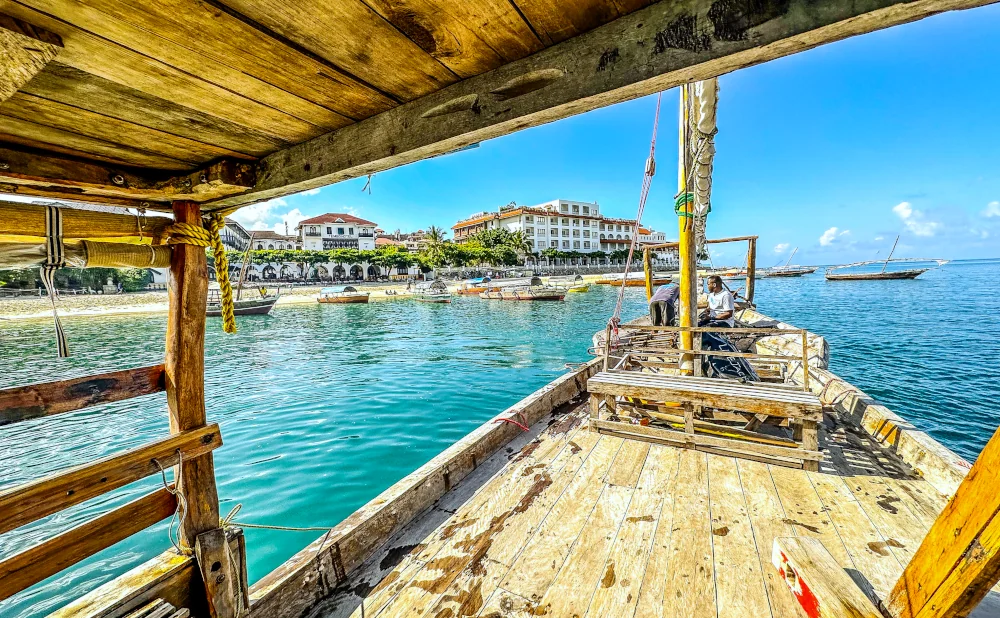Exploring the Vibrant Culture of Dar es Salaam
Dar es Salaam, the bustling heart of Tanzania, is a city teeming with life and culture.
Its vibrant streets echo with the rhythm of Swahili music, the aroma of local cuisine, and the chatter of diverse languages.
This city, nestled by the Indian Ocean, is a melting pot of cultures. It's a place where African, Arab, and Indian influences blend seamlessly, creating a unique cultural tapestry.
In this guide, we'll take you on a journey through the vibrant culture of Dar es Salaam. We'll explore its rich history, its lively festivals, its mouth-watering cuisine, and much more.
Whether you're planning a trip to Tanzania or simply curious about its culture, this article will provide you with valuable insights.
So, let's embark on this exciting journey and delve into the vibrant culture of Dar es Salaam.
Welcome to Dar es Salaam: A Cultural Hub
Dar es Salaam, often referred to as 'Dar', is the largest city in Tanzania. It's a bustling metropolis, a cultural hub that offers a unique blend of African, Arab, and Indian influences.
From the lively Kariakoo Market to the serene beaches along the Indian Ocean, Dar es Salaam is a city of contrasts. It's a place where modern skyscrapers stand alongside colonial buildings, where traditional music resonates amidst the urban hustle. Welcome to Dar es Salaam, a city that truly embodies the vibrant spirit of Tanzania.
The Historical Tapestry of Dar es Salaam
Dar es Salaam's rich history has shaped its vibrant culture. The city was founded in the late 19th century by Sultan Seyyid Majid of Zanzibar. Its name, meaning 'Haven of Peace' in Arabic, reflects the city's coastal charm.
Over the years, Dar es Salaam has been influenced by various cultures. From the Arab traders to the German and British colonial rule, each era has left its mark on the city. This historical tapestry is evident in the city's architecture, traditions, and local cuisine.
Today, Dar es Salaam is a melting pot of cultures. It's a city where history and modernity coexist, creating a unique cultural landscape that is truly Tanzanian.
Swahili Influences and the Indian Ocean
The Swahili culture is a significant part of Dar es Salaam's identity. This culture, with its roots in the Bantu people, has been shaped by centuries of trade with Arab, Persian, and Indian merchants. The Swahili language, widely spoken in Dar es Salaam, is a testament to this cultural fusion.
The Indian Ocean has also played a crucial role in shaping the city's culture. It has influenced the city's economy, lifestyle, and cuisine, making Dar es Salaam a vibrant coastal city with a unique cultural charm.
Architectural Wonders: From Colonial to Contemporary
Dar es Salaam's architecture is a visual narrative of its history. Colonial buildings stand as reminders of the city's past under German and British rule. These structures, with their European designs, contrast with the city's traditional Tanzanian architecture.
In recent years, modern skyscrapers have begun to redefine the city's skyline. These contemporary structures symbolize Dar es Salaam's growth and development. They stand as a testament to the city's progress, while still respecting its rich cultural heritage.
The city's architectural diversity is a reflection of its vibrant culture. It's a blend of the old and the new, the traditional and the modern.
Celebrating Tanzanian Traditions: Festivals and Music
Dar es Salaam is a city that loves to celebrate. Its calendar is filled with cultural festivals, the most notable being the Dar es Salaam International Film Festival. This event showcases Tanzanian cinema, promoting local talent and storytelling.
Music and dance are integral to the city's cultural fabric. Traditional Tanzanian styles like Taarab are popular, with performances often taking place at festivals and local gatherings. These musical expressions are a testament to the city's rich cultural heritage.
In Dar es Salaam, festivals and music are not just entertainment. They are a celebration of Tanzanian culture and identity.
A Taste of Tanzania: Local Cuisine and Markets
Dar es Salaam's culinary scene is a flavorful reflection of its cultural diversity. Street food stalls and local restaurants serve traditional dishes like Ugali and Nyama Choma, offering a taste of authentic Tanzanian cuisine.
The city's markets are a feast for the senses. The bustling Kariakoo Market, for instance, is a cultural and commercial hub. Here, locals and tourists alike can explore a variety of fresh produce, spices, and local delicacies.
- Ugali: A staple food made from cornmeal.
- Nyama Choma: Grilled meat, often served with Ugali.
- Kariakoo Market: A vibrant market offering a wide range of goods.
Artistic Expressions: Tingatinga, Crafts, and Museums
Art is a vibrant part of Dar es Salaam's culture. The city is known for its unique Tingatinga paintings, a style developed in the late 20th century. These brightly colored works often depict animals and rural life, reflecting Tanzania's natural beauty.
Local craft markets offer a chance to appreciate the city's artistic talent. Here, you can find handmade jewelry, textiles, and wood carvings. Each piece tells a story of the city's rich cultural heritage.
Museums like the Makumbusho Village Museum play a crucial role in preserving Tanzanian traditions. They offer a glimpse into the country's past and its diverse ethnic groups.
Religious Harmony: Mosques and Churches of Dar es Salaam
Religion plays a significant role in the culture of Dar es Salaam. The city is a melting pot of faiths, with mosques and churches standing side by side. This coexistence is a testament to the city's religious harmony.
The Azania Front Lutheran Church and Khoja Shia Ithnasheri Mosque are among the city's notable religious landmarks. Their architecture reflects the city's diverse cultural influences and adds to its unique skyline.
Engaging with Locals: Language and Customs
Interacting with locals is a key part of experiencing Dar es Salaam's vibrant culture. The city's residents are known for their warmth and hospitality. They are always eager to share their traditions and customs with visitors.
Language is a significant aspect of Dar es Salaam's culture. Kiswahili, the national language, is widely spoken. Learning a few basic phrases can enhance your interactions with locals and deepen your cultural immersion.
Respecting local customs is crucial when visiting Dar es Salaam. It's important to dress modestly and observe etiquette, especially when visiting religious sites.
When to Visit: Cultural Events and Best Seasons
Dar es Salaam is a city that thrives all year round. However, certain times of the year offer unique cultural experiences. The city's calendar is filled with vibrant festivals and events that showcase its rich culture.
Here are some key events to consider:
- Dar es Salaam International Film Festival: A celebration of Tanzanian cinema.
- Nyama Choma Festival: A culinary event dedicated to Tanzania's favorite barbecue dish.
- Sauti za Busara: A music festival that brings together artists from across East Africa.
Tips for Travelers: Safety, Transport, and Etiquette
Traveling to Dar es Salaam is an exciting adventure. However, like any other destination, it's important to keep safety in mind. The city is generally safe for tourists, but it's wise to avoid isolated areas at night and keep your belongings secure.
Getting around in Dar es Salaam is an experience in itself. The city's public transport includes buses, taxis, and Bajajis (auto-rickshaws). For a more authentic experience, try the local Dala Dala minibuses.
When it comes to etiquette, here are a few tips:
- Dress modestly, especially when visiting religious sites.
- Learn a few basic Swahili phrases. A simple "Jambo" (hello) can go a long way.
- Always ask for permission before taking photos of locals.
- Respect local customs and traditions.











